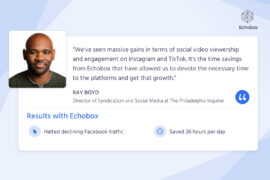In this week’s Roundup: Meta has a new social platform in the works, TikTok might have to consciously uncouple from ByteDance and how voice assistants found themselves losing the AI race.
News
As per Platformer’s Casey Newton, there may be a new social media platform in the pipeline. According to Newton, a young digital upstart named Meta is trying to muscle into the turf ceded by Twitter as its slow motion car crash continues to unfold.
But Meta’s new project (codename: P92) doesn’t just look to be a response to Twitter. Indeed, the whole “decentralized” angle looks a lot like Mastodon, another company who looked to profit from Twitter’s pain.
Creating such a decentralized platform comes with a few advantages and disadvantages for Meta. First, it neatly skirts the growing list of outrages occasioned by Meta’s content moderation guidelines by effectively devolving those decisions down to those in control of each server.
And secondly, it may also avoid the kind of regulatory ire that we have seen around anti-competitive behavior. Decentralizing the network could help it also become interoperable with other services, thereby reducing the accusations that these large social networks are walled gardens engaging in monopolistic practices.
On the negative side of the leger is the fact that no one has yet worked out how to reduce the seemingly inevitable friction that occurs when having to bridge independent servers across a single network. Not to mention the fact that no one has also worked out how to make this kind of decentralized social media system profitable.
TikTok’s got a problem on its hands: let’s call it the Jaden Smith Conundrum. What to do? What to do? One moment you’re the hottest property in town, popular with all the kids; the next you’ve made After Earth and people wouldn’t touch you with a stick. And it’s all your parents’ fault! So what do you do? Get emancipated, that’s what.
Young Jaden never followed through on his request to become an emancipated minor, but by the sounds of this article from Eva Mathews at Reuters, it seems that TikTok may have no other choice than to sever ties with parent company ByteDance and go it alone.
The thinking goes that if the major issue with TikTok is the potential access to personal data it grants to the Chinese government, then the only way to appease regulators may be for the Chinese parent company to simply divest from TikTok.
This is a last resort, depending on whether its billion dollar effort to beef up its data security passes muster with the US authorities. Nevertheless, given the current political climate, it remains a distinct possibility.
Analysis
“What nukes are to the physical world … AI is to everything else.” That’s the take of the Center for Humane Technology, a visionary/alarmist (delete as appropriate) non-profit who hosted a selection of 100 bigwigs in New York recently.
Moral panic and technology are hardly strange bedfellows, but fear of AI has been raised to an exquisite pitch and intensity that perhaps only nuclear technology can rival. AI is, of course, here to stay. Given that, the question of how we adapt the legal and social worlds in preparation for a future we can’t possibly foresee is taking up an awful lot of brainpower (although perhaps still not as much as we’d like).
Steven Levy at Wired argues that the transformative power of AI – the thing that makes it a possible threat to our societies and perhaps even our species – is the selfsame thing that makes it such a potentially beneficial development. But in such a lucrative, transnational arms race, the guardrails that many of us seek may be meaningless.
As generative AI dominates the tech news cycle, spare a thought for Alexa. There was a time when setting an alarm with a firm, half-shouted command like a tourist asking a foreign waiter for a coffee was the height of technological sophistication. Fast forward a few years and it all seems faintly ridiculous. Now technology can create answers to prompts capable of passing university exams.
How voice assistants like Alexa, Siri and the Google Assistant squandered their dominance in this particular field is documented in this article by Brian X. Chen, Nico Grant and Karen Weise in The New York Times.
The piece documents how the voice assistants’ technical basis as “command-and-control” systems means that they are incredibly unwieldy and require mountains of work to push through a simple update, as well as how a series of strategic dead ends hobbled the technology’s development.
AI
Such is the pace of innovation in AI that GPT-3 is already but a shadow in the social imaginary, like the handloom or Jussie Smollett.
After barely a minute as the internet’s plaything du jour, GPT-3 has been superseded by GPT-4, writes The Verge’s James Vincent, a new and improved version that’s apparently new but not really visibly improved. “People are begging to be disappointed and they will be,” says OpenAI CEO Sam Altman with winning candor and not a little expectation management.
According to the press bumf accompanying its release, GPT-4 is “more creative and collaborative than ever before” not to mention more “accurate.”
Still, it’s something new for the internet to poke and probe and surely a font of content in the months ahead.
Talking of GPT content… We all have workflow problems – those little tasks that get in the way of meatier things. Well, Jennifer A. Kingson of Axios reports that various religious leaders are hearing the call of GPT-3 to lighten the load: “Come unto me, all ye that labour and are heavy laden, and I will give you rest.”
The technology isn’t without its drawbacks (is it ever?). Users report that while it’s strong on the textual stuff like scriptural analysis, it is, to quote one pastor, “a didactic bore,” and, to quote another user, lacking “any human warmth.” On another note, did you hear about Elon Musk’s unorthodox exit interview with a disabled employee?


/cloudfront-us-east-2.images.arcpublishing.com/reuters/OOUXND3DM5MTHIVPCCBR4J5NZY.jpg)


/cdn.vox-cdn.com/uploads/chorus_asset/file/24390408/STK149_AI_01.jpg)



